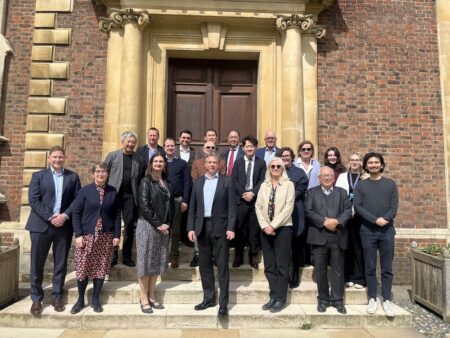The WYNG-Hatton lecture and conference, 17-18 April 2024
You can watch the video of the WYNG-Hatton lecture, which took place ahead of the conference, here, on the website of the Centre for Medical Ethics and Law, University of Hong Kong.
The regulation and governance of AI, data and digital health was the theme for this year’s WYNG-Hatton conference, hosted in Cambridge by the PHG Foundation.
Galvanised by the lecture from Dr Eric Meslin, colleagues from three collaborating centres of excellence in medical law and medical ethics – Hong Kong (CMEL, HKU), Cambridge (LML and PHG Foundation, University of Cambridge), and Montreal (CGP, McGill University) – met to unpick and explore the challenges policy makers face when regulating AI.
Speakers from the three centres explored some of the pivotal developments in data driven health innovations and AI, the conceptual questions they raise, and emerging challenges for the regulation and governance of these technologies.

Members of the PHG Foundation with the speakers of the WYNG-Hatton conference 2024
The presentations covered a diverse range of topics that highlighted the fact that AI is not one single technology with a single set of potential benefits or harms and raised a number of pertinent questions including:
- How do we align values in an increasingly interconnected world?
- How might learning health systems blur the traditional divide between research and care, raising unique ethical, regulatory and governance challenges?
- Are current frameworks ready and able to grapple with the existing and novel questions that AI raises?
- How might AI impact children specifically and are new regulatory and governance tools needed to protect the rights and interests of children?
- Are data the kind of ‘things’ that can be owned and should we conceive of it in this way? What benefits might doing so confer?
- Should we move beyond ‘data’ as a focus for regulation and governance of AI technologies?
- Do AI based medical tools differ in significant ways from traditional ones?
The sessions provided interesting insight into what experts in relevant areas of law and ethics envision the future will be for current and coming generations, by considering some of the most pressing issues for digital health and how they could be addressed.
Of particular note are the need to better identify novel harms that arise from inscrutable automation; those that arise from reducing humans from an early age to data points and its effect on their rights and dignities; and how these technologies might challenge our traditional tools of redress. Additionally, the environmental sustainability of powering AI and the symbiotic relationship between environmental and human health deserves more attention.
As such, efforts to ensure human interests are placed at the centre of questions concerning governance of emerging technologies may be necessary. Doing so may better reflect the original rationale for governing such technologies: to protect individuals, populations and their humanity.
We would like to give special thanks to Dr Eric Meslin for his thought-provoking lecture and to all of those who attended and who contributed to the discussions, as well as the WYNG Foundation and Hatton Trust who generously supported the event.

